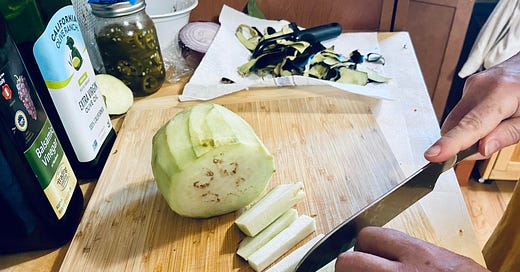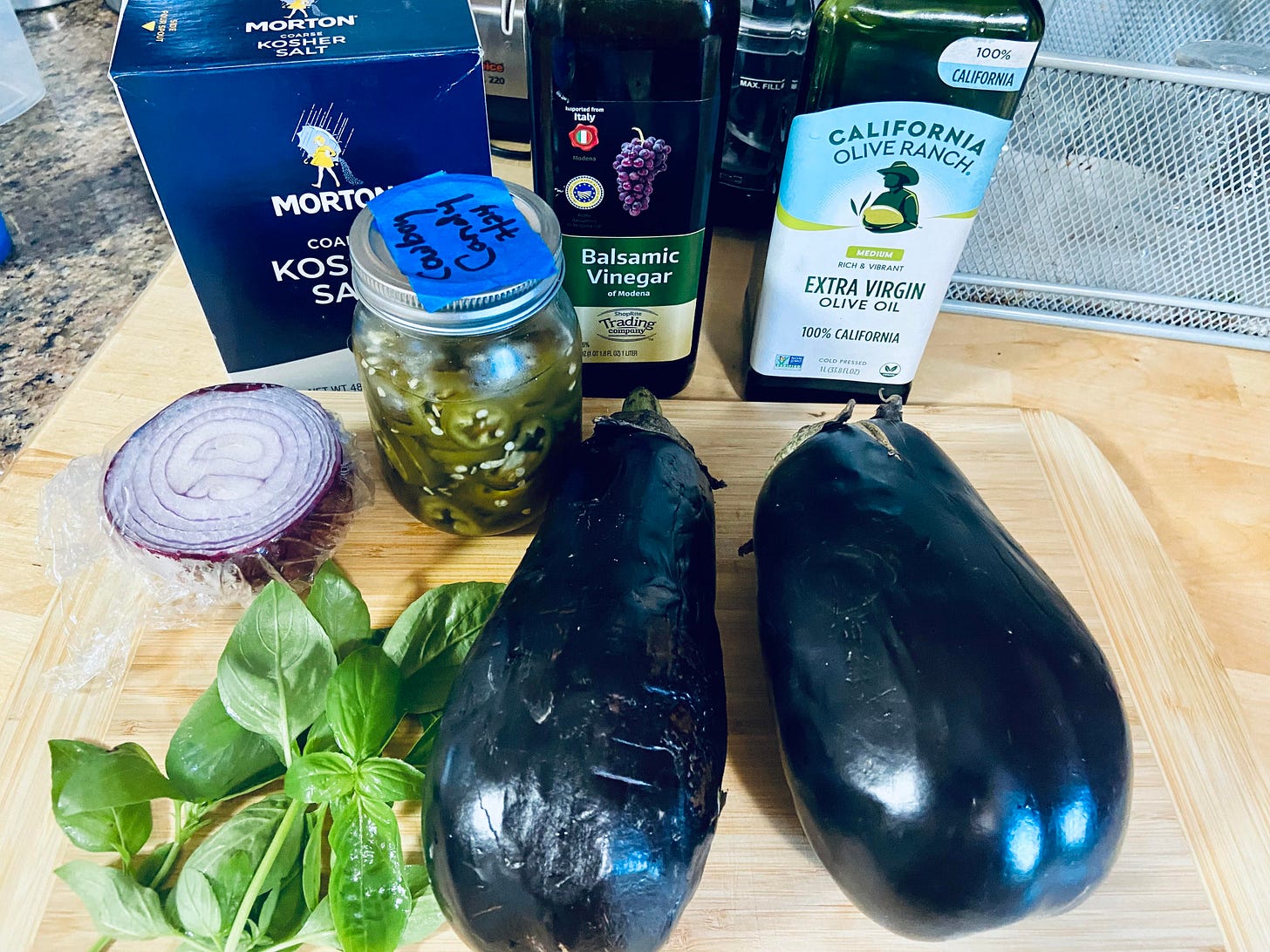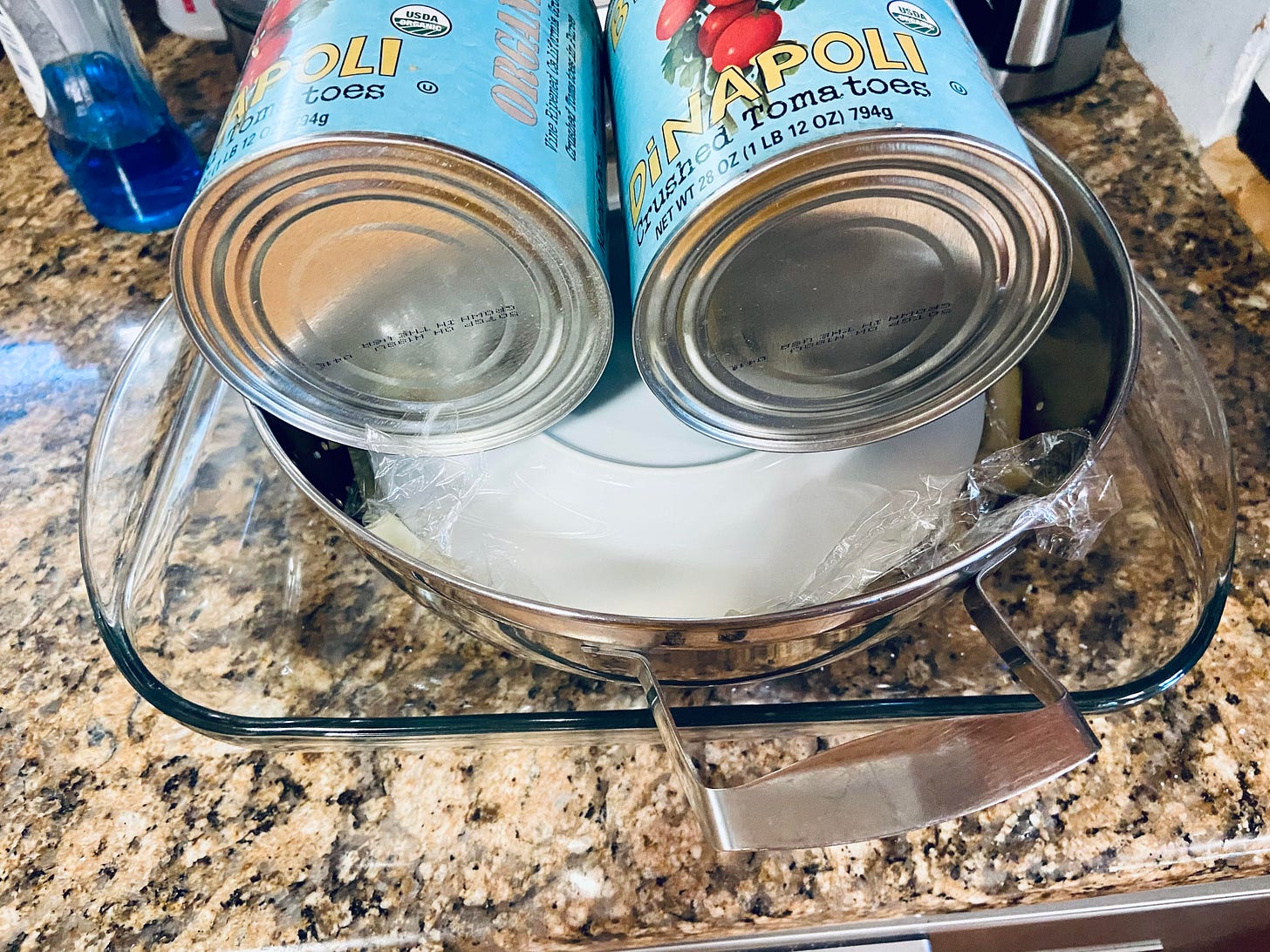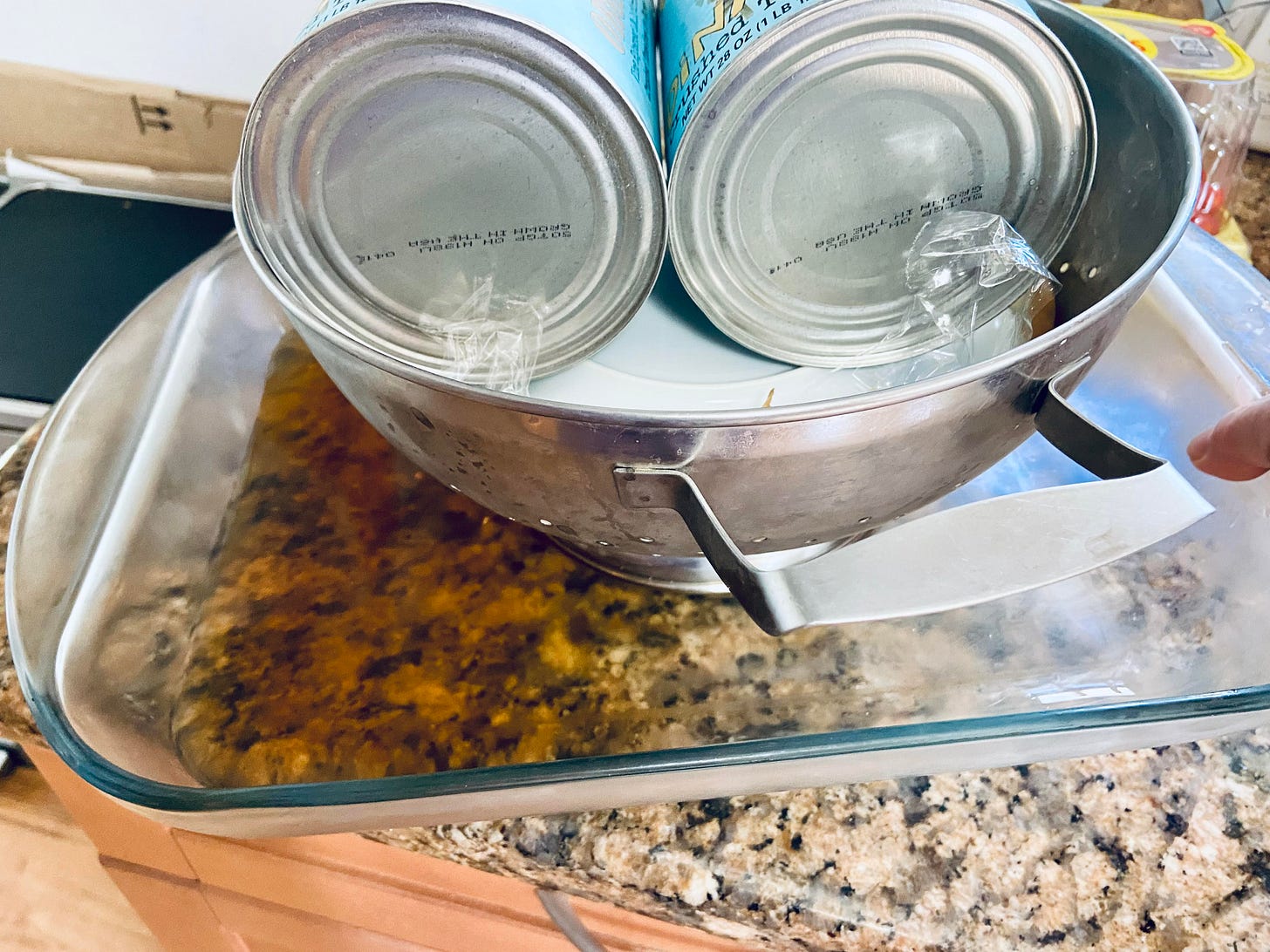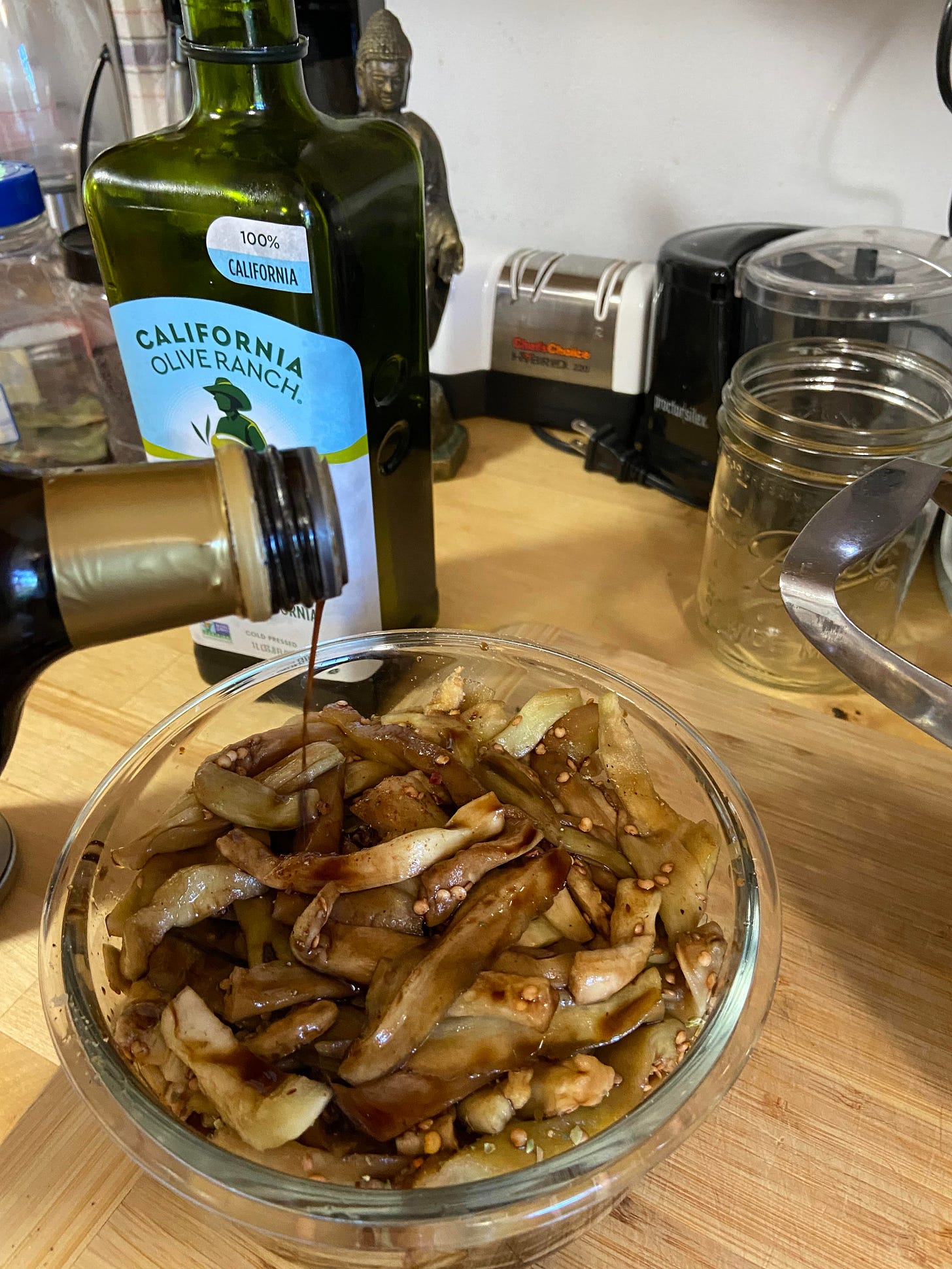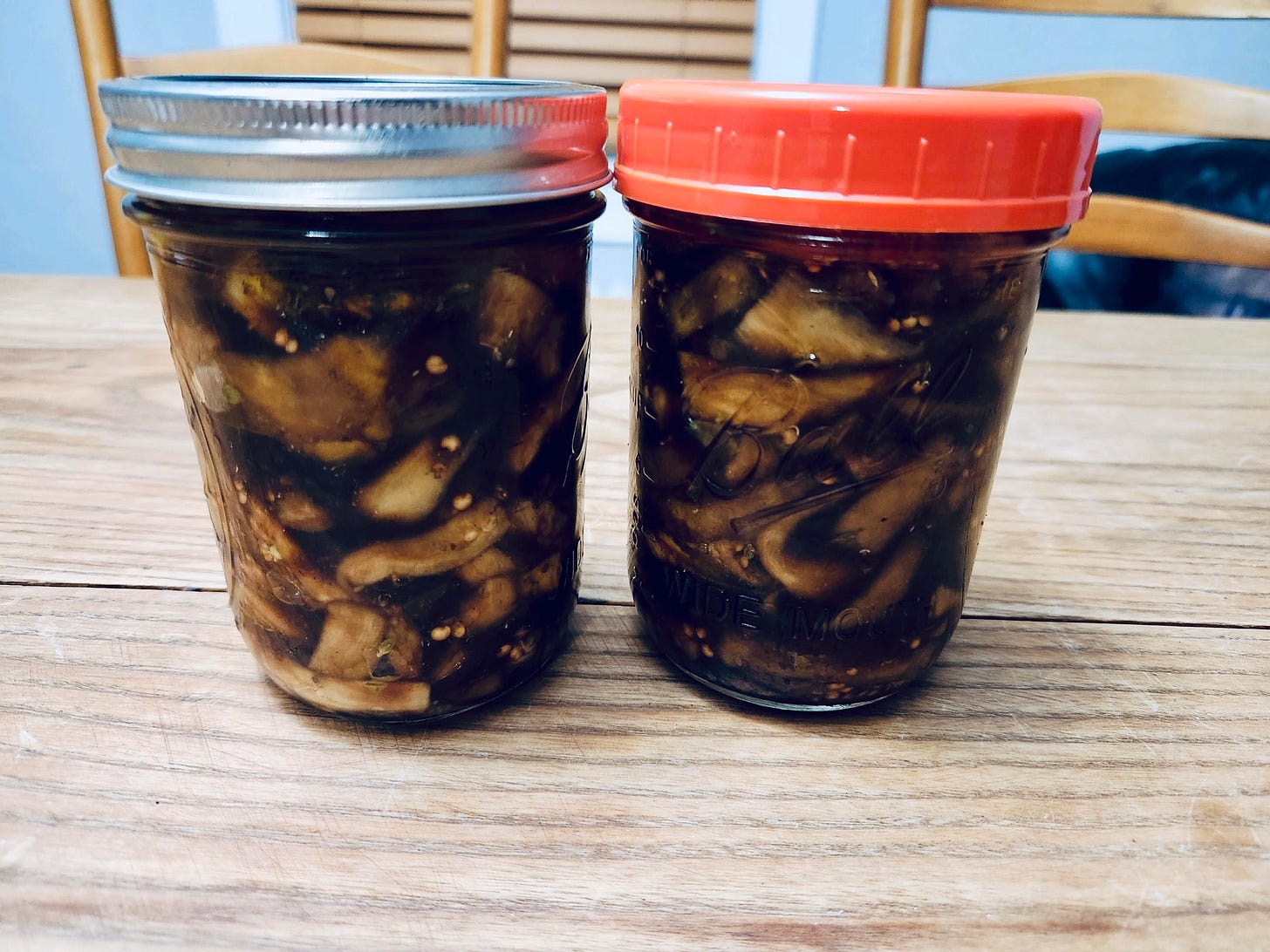Rachel's Uncle's Pickled Eggplant
When a beloved recipe is passed to younger relatives, a sentimental piece of the older person’s past is shared, and what is more loving than giving a part of your heart to someone?
Hello, my friend,
Call us weird, but when members of my family greet each other, we are usually less interested in “So what have you been up to?” than we are in “What did you eat?”
The ensuing conversation about what has been consumed and enjoyed is a serious one to us. And we rarely leave the discussion at the “what.” It continues — with equal amounts of interest on the part of the questioner and the questioned — through how the ingredients were prepared for cooking, what seasonings were used, what they ate with it and whether they might prepare it differently next time.
The miracle of these conversations is that when they have run their course, all feel fed, at least spiritually. The questioner has new ideas for a future meal and the questioned has had the experience of reliving a past one. Notice that I said “experience” and not “pleasure.” We are just as capable of gossiping about bad meals as we are capable of rhapsodizing about good ones.
We give a special place of honor to recipes that were passed to us from relatives. My older child, Carly, prepares an exquisite vodka sauce that was the brainchild of their boyfriend’s grandfather. Jake’s grandfather is far too shy to take credit for it, but this sauce, redolent of sweet shallots and just a bump of vodka, has made a convert out of a previously vodka sauce-disliking me. I will try to recreate it in a future newsletter, I promise, but right now I can tell you that we all get excited when the ingredients for the sauce appear on the family shopping list, because we know that we will soon be eating well.
Inherited recipes are tangible ways of saying “I love you.” When a beloved recipe is passed to younger relatives, a sentimental piece of the older person’s past is being shared, and what is more loving than giving a part of your heart to someone? Also, for our elders, sharing a recipe is a nonintrusive way of saying “I hope you are sufficiently fed.” During past days of food insecurity, that was the most loving thing you could wish someone.
My friend and colleague, Rachel, recently shared a recipe with me that her uncle passed to her. It’s for melanzane, a pickled eggplant condiment or antipasto that is preserved in olive oil.
Rachel’s grandparents were from Italy, although they met in the States. She says that her grandma would make jars of it — spicy and plain — and give them to family members. I feel loved just thinking about it, and I didn’t even know her.
Rachel remembers eating melanzane mostly in sandwiches when she was a child, but it is just as good with some cheese on a cracker or slice of baguette. I sometimes eat it straight out of the jar when I need an infusion of sweet and tangy, vinegar-infused vegetable, which is quite often, as it happens.
And it is endlessly variable in terms of acidity and spices. That puts you in the driver’s seat with this recipe, which is as it should be.
This is a good time to bring up the fact that this recipe is the way I made it, not the recipe as I got it from Rachel. I used the ingredients that I had in the house, and flavored it to my own tastes. I don’t believe this is disrespectful to Rachel’s grandmother at all. If anything, I believe that she would be proud that Rachel shared it with me, and that I had the resourcefulness to make use of what I had at the time. I’m fairly certain that, in her time, she would have done the same.
Do not be afraid of the time it takes to make this recipe. The salted eggplant has to drain for at least 24 hours, to remove the bitter juices and to press the water out, which improves the texture. I started this one Saturday afternoon and drained the eggplant on Sunday afternoon. Rachel’s grandma may have pressed it longer, but I am not as patient as she was.
So let’s haul out the ingredients, quickly acknowledging and then setting aside the fact that I forgot to photograph the addition of everything except the eggplant.
Eggplants1
Kosher salt, about 1/2 cup per two eggplants2
Jarred and sliced Italian pickled peppers3
Red onion
Fresh basil4
Olive oil
Vinegar5
Optional: Red pepper flakes, if you like it spicy
Not in the photo: Jars that have been sanitized so that we don’t die of botulism. Just a friendly reminder.
Also not in the photo: A colander, baking dish to capture the juices as they drain, plastic wrap, a small plate to fit over the eggplant and something weighty to hold everything down. I used two cans of crushed tomatoes.
Peel the eggplant and slice it into sticks that are roughly 1/4” — 1/2” wide. They will shrink a bit when they are pressed.
Put the eggplant sticks in a large bowl and salt them. Toss with your hands to combine and then transfer the salted eggplant to a colander that has been set in a baking dish.
Cover the eggplant with some plastic wrap, place an inverted small plate on top, and then weigh everything down with something heavy, such as large cans of food.
Place the entire contraption into the fridge over night. Twenty-four hours later, you will see some dark liquid in the dish. Discard the liquid, uncover everything, and blot the eggplant with dry paper towels.
Put the pressed eggplant in a large bowl. Drizzle with the vinegar. Add the onion and the herbs now and toss. Kick yourself for forgetting to photograph this step, as I did.
Cover the eggplant with olive oil.
Carefully spoon the eggplant and olive oil into your clean jars. If you are as neurotic about trying to clean up spilled oil as I am, get you a canning funnel. You’re welcome.
I put these in the refrigerator because, as I have said, I am neurotic about microbes such as Clostridium botulinum. Refrigeration will make the olive oil solidify, but the oil comes back to a liquid state after a few minutes at room temperature.
On that note, put some melanzane on a sub sandwich for a tangy crunch. Add some to a charcuterie board. Liven up a plain cheese sandwich, as Rachel’s cousin does. You can do almost anything with this, and you will enjoy every bite.
And every time you spoon some of the melanzane out of the jar, say a quiet “thank you” to Rachel’s uncle and grandma for showing us how much they love us.
Until next time,
Deb
I used the big purple kind because I had them, as you can tell from the fact that they look like they were on my counter for a week, which they were. You can use any kind you want.
The salt is to draw the bitter juices out of the eggplants, but you don’t want the overall taste of the melanzane to be too salty. Use your judgment on how much you salt them. You probably need less than you think you do.
I had sweet pickled jalapeños in the house. Sue me. You might want to use the Italian peppers in the jar.
Dried is also fine. I had fresh basil because I made this in the summertime. In fact, get out your dried Italian seasoning and put that in too.
The original recipe calls for a white vinegar. I like balsamic vinegar to the extent that I could drink it straight from the bottle, so I used that. You do you.

